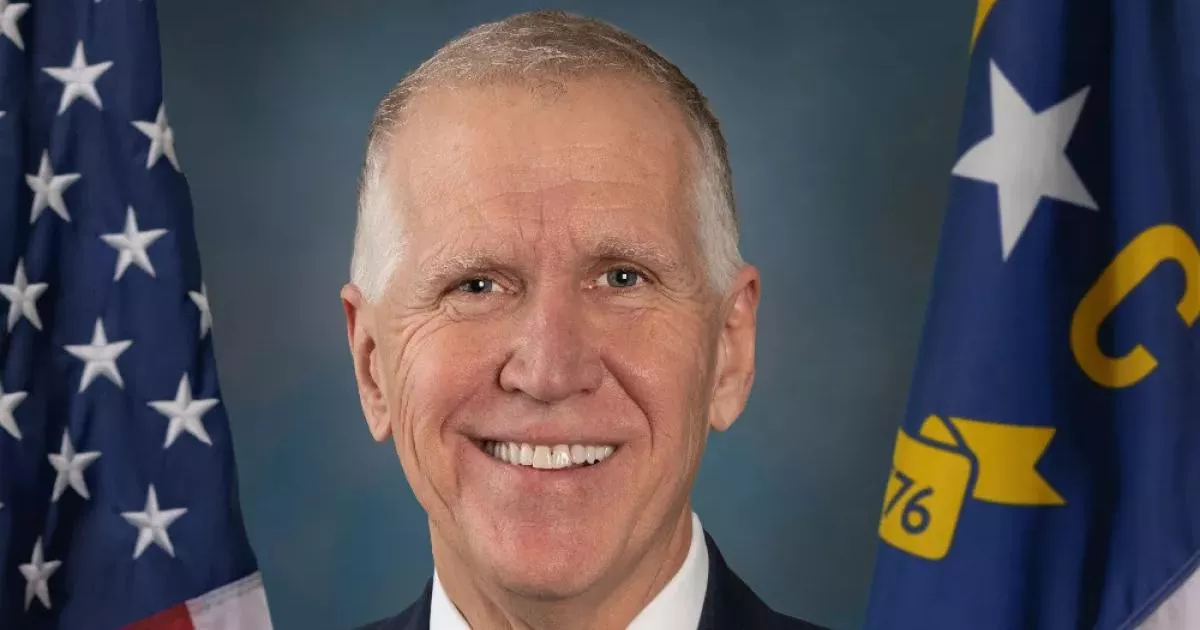Thom Tillis is the senior U.S. Senator from North Carolina, serving since 2015. A Republican, he previously served in the North Carolina House of Representatives from 2007 to 2015, holding the Speaker position from 2011. Tillis won his Senate seat in 2014, defeating incumbent Kay Hagan and was reelected in 2020. He assumed the role of senior senator upon Richard Burr's retirement in 2023. His career reflects a consistent involvement in North Carolina politics and the Republican Party.
August 30, 1960: Birth of Thomas Roland Tillis
On August 30, 1960, Thomas Roland Tillis was born. He is now a businessman and politician.
1978: Graduation from high school
In 1978, Thom Tillis graduated from high school and left home to get a job.
1990: Joined Price Waterhouse
In 1990, Thom Tillis was recruited to work for the accounting and consulting firm Price Waterhouse.
1996: Received Bachelor of Science
In 1996, Thom Tillis received a Bachelor of Science in technology management from the University of Maryland University College.
1996: Promoted to Partner
In 1996, Thom Tillis was promoted to partner at Price Waterhouse.
1998: Republicans won majority in the North Carolina House.
In 1998, Republicans won a majority in the North Carolina House.
1998: Moved to Cornelius, North Carolina
In 1998, Thom Tillis and his family moved to Cornelius, North Carolina.
2002: Began Political Career
In 2002, Thom Tillis began his political career in Cornelius, pushing for a local bike trail and getting elected to the town's park board.
2003: Ran for Town Commissioner
In 2003, Thom Tillis ran for town commissioner and tied for second place.
2006: Elected to the General Assembly
In 2006, Thom Tillis was elected to the General Assembly after defeating incumbent John W. Rhodes in the Republican primary.
2007: Served in the North Carolina House of Representatives
In 2007, Thom Tillis began serving in the North Carolina House of Representatives, a position he held until 2015.
2007: Voted in favor of a measure
In 2007, Thom Tillis voted in favor of a measure to give North Carolina a renewable portfolio standard.
2008: Reelected Unopposed
In 2008, Thom Tillis was reelected unopposed to the General Assembly.
2009: Left IBM
In 2009, Thom Tillis formally left IBM.
2010: Opposed Minimum Wage Increase
In 2010, Thom Tillis opposed increasing North Carolina's minimum wage from $7.25 an hour.
2010: Campaign Chairman
In 2010, Thom Tillis served as the campaign chairman for the House Republican Caucus. He was also reelected unopposed to the General Assembly in 2010.
2011: "GOP Legislators to Watch"
In 2011, Governing magazine named Thom Tillis and North Carolina Senate President pro tempore Phil Berger "GOP Legislators to Watch".
2011: Speaker of the North Carolina House of Representatives
In 2011, Thom Tillis became the Speaker of the North Carolina House of Representatives, a position he held until 2015.
2011: Supported Ultrasound Law
In 2011, as speaker of the North Carolina House of Representatives, Thom Tillis helped the House pass a law requiring abortion providers to perform an ultrasound on women seeking abortions four hours before the procedure.
2011: Divide and Conquer Speech
In a 2011 speech, Thom Tillis said, "What we have to do is find a way to divide and conquer the people who are on assistance".
2012: Voted to defund Planned Parenthood
In 2012, Thom Tillis voted to defund Planned Parenthood in North Carolina.
2012: Reelected Unopposed
In 2012, Thom Tillis was reelected unopposed to the General Assembly.
2012: Pushed for North Carolina Amendment 1
In 2012, Thom Tillis, as speaker of the North Carolina House, played a leading role in pushing for North Carolina Amendment 1, a state constitutional amendment that banned same-sex marriage and civil unions.
2012: Legislation reducing early voting days
In 2012, after Republican Pat McCrory was elected governor, Thom Tillis presided over legislation that reduced early voting days, invalidated ballots cast outside one's precinct, and required specific kinds of photo ID in order to vote.
2013: Supported Motorcycle Safety Bill
In 2013, Thom Tillis supported a motorcycle safety bill that had been surreptitiously amended to include restrictions on abortion.
2013: Reelected as Speaker
In 2013, Thom Tillis was unanimously reelected as Speaker of the North Carolina House.
2014: Campaign Paid Cambridge Analytica
During the 2014 campaign, the Tillis campaign and the North Carolina Republican Party paid $345,000 to the data analysis firm Cambridge Analytica to microtarget voters.
2014: Protests and Arrests
In 2014, 14 people protesting cuts to the earned income tax credits program and Thom Tillis's refusal to expand Medicaid were arrested after staging a sit-in in his office.
2014: Announced Run for U.S. Senate
In 2014, Thom Tillis announced that he would not seek reelection to the state House, instead running for U.S. Senate against first-term Democratic incumbent Kay Hagan.
2014: Appealed Ruling That Amendment 1 Was Unconstitutional
In 2014, Thom Tillis appealed a ruling that North Carolina Amendment 1, which banned same-sex marriage and civil unions, was unconstitutional.
2014: Denied climate change
In 2014, Thom Tillis denied that climate change was occurring.
2014: Opposed Increasing Federal Minimum Wage
In 2014, Thom Tillis opposed increasing the federal minimum wage.
2014: Elected to the Senate
In 2014, Thom Tillis was elected to the Senate, defeating Democratic incumbent Kay Hagan.
2014: Supported Personhood Bill
In 2014, a Thom Tillis spokesman told The Washington Post that Tillis would support a personhood bill if it were brought to the Senate floor, but only if abortion would continue to be legal "in cases of rape, incest and when the life of the mother is in danger" and if women would continue to "have access to contraceptives."
2014: NRA Spent Money During His Senate Campaign
In 2014, the NRA Political Victory Fund spent $4.4 million during Thom Tillis's Senate campaign, with half in support of Tillis and half in opposition to Hagan.
2014: Dark Money
In the 2014 election, Thom Tillis received $22,888,975 in "dark money", which constituted 81% of non-party outside spending in support.
2015: Called for opening up the United States' Atlantic coast
During his first speech on the Senate floor, in 2015, Thom Tillis called for opening up the United States' Atlantic coast for offshore drilling.
2015: Became U.S. Senator
In 2015, Thom Tillis became the senior United States Senator from North Carolina, a seat he has held since.
2015: Opt-Out Hand-Washing Regulations
In 2015, Thom Tillis said coffee-shop companies should be able to "opt out" of hand-washing regulations "as long as they post a sign that says, 'We don't require our employees to wash their hands after leaving the restroom.'
2015: Voted against an amendment
In 2015, Thom Tillis voted against an amendment acknowledging climate change and the contribution of human activity.
2015: Voted for Amendment Allowing Same-Sex Couples Access to Government Resources
In 2015, Thom Tillis voted for an amendment to a non-binding resolution that would allow same-sex married couples living in states that do not recognize same-sex marriage to have access to government resources.
2015: Supreme Court Ruled Bans on Same-Sex Marriage Violated the U.S. Constitution
In 2015, the Supreme Court of the United States ruled that bans on same-sex marriage violated the U.S. Constitution.
2015: Became a Member of the Senate Whistleblower Protection Caucus
Since 2015, Thom Tillis has been a member of the Senate Whistleblower Protection Caucus, which raises awareness for protections against retaliation for private and government employees reporting wrongdoing.
2016: Trump's comments "indefensible"
After the release of the Access Hollywood tape during the 2016 United States presidential election, Tillis called Trump's comments "indefensible".
2016: Opposed filling Supreme Court vacancy
In 2016, Thom Tillis opposed filling the then Supreme Court vacancy until after the election, adding the nomination "would be best left to the next president."
2016: Voted on Gun Control Bills After Orlando Shooting
In 2016, after the Orlando nightclub shooting, Thom Tillis voted for Republican bills to increase funding for the federal background check system and delay gun sales for 72 hours for individuals on the terrorist watchlist, but against Democratic bills to ban individuals on the terrorist watchlist from purchasing a gun and require background checks at gun shows and during online sales.
March 2017: Voted for Broadband Consumer Privacy Proposal
In March 2017, Thom Tillis voted for the Broadband Consumer Privacy Proposal that removed the FCC's internet privacy rules and allowed internet service providers to sell customers' browsing history without their permission.
November 2017: Opposed Trump's nomination
In November 2017, Thom Tillis opposed Trump's nomination of Michael Dourson for an EPA role.
2017: Called on Trump
In 2017, Thom Tillis called on Trump to withdraw the United States from the Paris Agreement.
2017: Signed Letter Condemning Rohingya Genocide
In 2017, Thom Tillis was one of 21 senators who signed a letter condemning the genocide of the Rohingya Muslim minority in Myanmar.
2017: Proposed Legislation on DACA
In 2017, amid moves by President Trump to cancel DACA, Thom Tillis proposed legislation to allow some undocumented youth to apply for renewable five-year residency and citizenship as a more conservative alternative to the DREAM Act.
January 2018: Signed letter to Trump
In January 2018, Thom Tillis was one of 36 Republican senators to sign a letter to Trump requesting he preserve the North American Free Trade Agreement.
2018: Beneficiary of NRA Funding
As of 2018, Thom Tillis was the third-largest beneficiary of NRA funding in Congress.
2018: Believed climate change is happening
In 2018, Thom Tillis said he believed climate change is happening and that humans may contribute to it, but remained unclear about whether he agrees with the scientific consensus on climate change that it is human-caused.
2018: Introduced Legislation to Compensate for ACA Preexisting Conditions Requirement
In 2018, amid attempts to repeal the ACA, Thom Tillis introduced legislation to compensate for the ACA's requirement that insurers cover people with preexisting conditions, but it was criticized for loopholes. Tillis later said he could make improvements and that it was meant to start a discussion.
February 2019: Wrote Op-Ed Opposing Trump's Emergency Declaration
In February 2019, Thom Tillis wrote an op-ed in the Washington Post opposing Trump's national emergency declaration concerning the southern border, which diverted funding from the Department of Defense to build a border wall between the United States and Mexico.
December 2019: Tucker Drops Out
In December 2019, Garland Tucker dropped out of the Republican primaries after Trump endorsed all incumbent Republican senators up for election in 2020, including Thom Tillis.
2019: Signed a letter
In 2019, Thom Tillis was one of 20 senators to sign a letter asking the EPA to regulate the amount of per- and polyfluoroalkyl substances in drinking water, after reports that they would not.
April 2020: Expressed Concerns About Internet Archive's National Emergency Library
In April 2020, Thom Tillis expressed concern that the Internet Archive's "National Emergency Library" initiative, which temporarily expanded access to its 1.4 million-book collection during the COVID-19 shutdown, violated copyright law.
May 2020: Voted Against Amendment to FISA
In May 2020, Thom Tillis voted against an amendment to the Foreign Intelligence Surveillance Act to bar warrantless surveillance of web browser history.
September 2020: North Carolina Remained One of 12 States to Not Expand Medicaid
As of September 2020, North Carolina remains one of only 12 states not to have expanded Medicaid, due to legislation blocking expansion that Thom Tillis led in the state House of Representatives.
September 2020: Supported immediate vote on President Trump's nominee
In September 2020, Thom Tillis supported an immediate vote on President Trump's nominee for the Supreme Court, less than two months before the next presidential election.
October 2, 2020: Tested Positive for COVID-19
On October 2, 2020, Thom Tillis tested positive for COVID-19 after a White House event.
October 2020: Cunningham Acknowledges Affair
In October 2020, Cal Cunningham acknowledged having an extramarital affair, reducing his lead in the polls against Thom Tillis.
2020: Expressed Support for Soleimani Assassination
In 2020, Thom Tillis expressed support for the US military's assassination of Iranian Major General Qasem Soleimani by drone strike at Baghdad International Airport.
2020: Reversed Position on Trump's Declaration
In 2020, Thom Tillis reversed his position and voted for Trump's emergency declaration after initially opposing it and facing pressure, including potential primary challenge.
2020: Reelected in Senate
In 2020, Thom Tillis was reelected in Senate.
2020: Second in solar energy production
In 2020, the state was second in solar energy production.
2020: Tried to "remake himself"
In his 2020 Senate campaign, InsideClimate News described Thom Tillis as trying to "remake himself as a moderate proponent of market-based climate solutions" despite a "record as a fossil fuel advocate closely aligned with Trump".
January 2021: Voted with Trump
As of January 2021, Thom Tillis has voted with Trump's stated positions 90% of the time.
March 29, 2021: Announced Prostate Cancer Diagnosis
On March 29, 2021, Thom Tillis announced he had prostate cancer and would be undergoing surgery and treatment. He encouraged men to have regular prostate health screenings.
May 28, 2021: Voted Against Independent Commission to Investigate Capitol Attack
On May 28, 2021, Thom Tillis voted against creating an independent commission to investigate the 2021 United States Capitol attack.
August 2021: Stated Those Involved in Capitol Attack Should Be Held Accountable
In August 2021, Thom Tillis said that "many involved" in the January 6th Capitol attack "needed to be held accountable and go to prison."
2021: Inserted Amendment to Make Commercial Streaming a Felony
In 2021, Thom Tillis inserted an amendment to the Consolidated Appropriations Act of 2021 to make the unauthorized commercial streaming of copyrighted material a felony.
July 2022: Expressed Support for Bipartisan Bill to Codify Same-Sex Marriage
In July 2022, Thom Tillis said that he would "probably" support a bipartisan bill to codify same-sex marriage in the U.S.
November 2022: Called Senate's Same-Sex Marriage Bill "'a good compromise... based on mutual respect for our fellow Americans'"
In November 2022, Thom Tillis called the Senate's same-sex marriage bill "'a good compromise... based on mutual respect for our fellow Americans'" and expressed support for it.
November 29, 2022: Voted for the Respect for Marriage Act
On November 29, 2022, Thom Tillis voted for the Respect for Marriage Act, which passed the Senate and was enacted. The law repealed the Defense of Marriage Act (DOMA) and codified rights to same-sex and interracial marriage into federal law.
2022: Voted Against Honoring our PACT Act of 2022
In 2022, Thom Tillis was among the 11 senators who voted against the Honoring our PACT Act of 2022, a bill that funded research and benefits for up to 3.5 million veterans exposed to toxic substances during their service.
2022: Supported Bipartisan Safer Communities Act
In 2022, Thom Tillis was one of 15 Republican senators to support the Bipartisan Safer Communities Act, which included funding for state red flag provisions, school safety resources, stronger background checks for buyers under 21, and penalties for straw purchases.
2023: Became Senior U.S. Senator
In 2023, Thom Tillis became the state's senior U.S. senator when Richard Burr retired.
2023: Censured by North Carolina Republican Party
In 2023, the North Carolina Republican Party voted to censure Thom Tillis, particularly over his stances on immigration and gay marriage.
February 2025: Called Putin a War Criminal
In February 2025, Thom Tillis called Russian President Vladimir Putin a war criminal and the greatest threat to democracy, also describing him as a liar and murderer, while not directly criticizing Trump's approach to the conflict.
May 2025: Opposed Confirmation of Ed Martin
In May 2025, Thom Tillis announced that he would oppose the confirmation of Ed Martin, President Trump's nominee for United States Attorney for the District of Columbia, due to Martin's defense of rioters who breached the Capitol during the January 6 United States Capitol attack. Tillis's opposition was fatal to Martin's confirmation prospects, and Trump withdrew the nomination.
2025: Involved in Allegations Concerning Hegseth Confirmation
In 2025, Thom Tillis allegedly told Secretary of Defense nominee Pete Hegseth's ex-sister-in-law that a sworn statement about Hegseth's alcohol abuse would "carry weight." Tillis voted to confirm Hegseth, citing lack of corroboration, despite initial concerns. Allegedly, President Trump threatened to support a primary challenge against him if he did not vote to confirm.
2025: Concerns about Medicaid cuts
In Juni 2025, Thom Tillis opposed about concerns about Medicaid cuts the "Big Beautifull Bill"; as a result, Trump threatened to support primary challengers against him.
Mentioned in this timeline

Ruth Bader Ginsburg was an American lawyer and Supreme Court...
The Affordable Care Act ACA also known as Obamacare is...

The White House located at Pennsylvania Avenue NW in Washington...
California is a U S state on the Pacific Coast...
Myanmar also known as Burma is a Southeast Asian country...
Medicaid is a joint federal and state government program providing...
Trending

46 minutes ago Ashley Padilla shares life lessons learned as Diane Keaton's assistant on SNL.

46 minutes ago Bryce Dallas Howard Celebrates 45th Birthday: A Look at Her Career

47 minutes ago Cameron Brink Reveals Fiancé's Email Introduction and Disappoints Fans with Relationship Status.

47 minutes ago Nate Williams shines in G League, joins Warriors amid blowout loss.

2 hours ago US, Israel launch military operation against Iran, airstrikes kill leader, Gulf earthquake follows.

2 hours ago Kaitlan Collins covers Bill Clinton's Epstein testimony and calls out Trump allies.
Popular

Jesse Jackson is an American civil rights activist politician and...

Hillary Diane Rodham Clinton is a prominent American politician lawyer...

Jim Carrey is a Canadian-American actor and comedian celebrated for...

XXXTentacion born Jahseh Dwayne Ricardo Onfroy was a controversial yet...

Kashyap Pramod Patel is an American lawyer who became the...

Michael Joseph Jackson the King of Pop was a highly...
